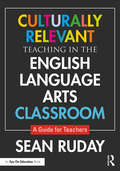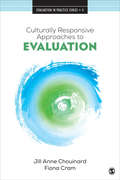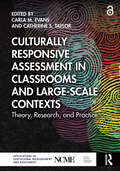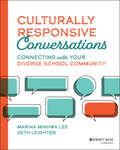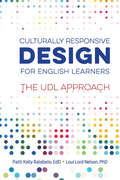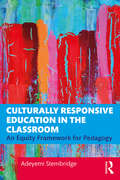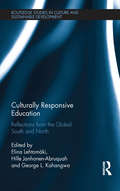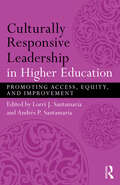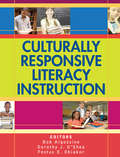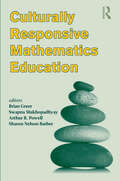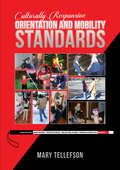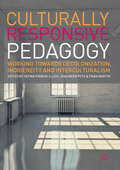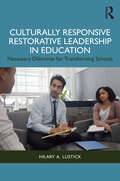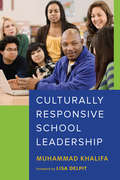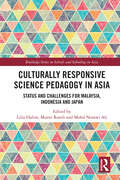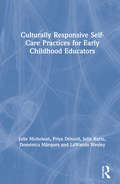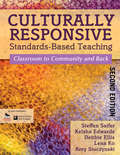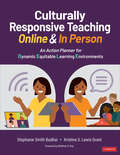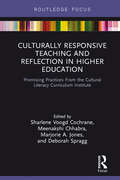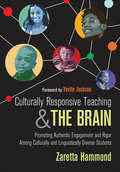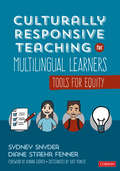- Table View
- List View
Culturally Relevant Teaching in the English Language Arts Classroom: A Guide for Teachers
by Sean RudayThis book is a practical, research-based, classroom-ready resource for English language arts teachers interested in learning how to incorporate culturally relevant pedagogy into all aspects of their instruction, including writing, reading, and vocabulary lessons. It also provides suggestions for building an inclusive classroom environment in which all students’ backgrounds are valued. Topics covered: Writing strategies and diverse texts Dialect and student writing Applying reading strategies to texts that represent diverse backgrounds Using reading strategies in out-of-school contexts Considering students’ funds of knowledge and language awareness Connecting linguistic diversity to word-root instruction Building an inclusive classroom environment The appendix features several useful tools, including a study guide, a comprehensive list of suggested texts, recommendations for parent communication, and reproducible tools for the classroom. The study guide and reproducibles are available for free download from our website at www.routledge.com/9781138393318.
Culturally Responsive Approaches to Evaluation: Empirical Implications for Theory and Practice (Evaluation in Practice Series #4)
by Fiona Cram jill ChouinardEvaluators have always worked in diverse communities, and the programs they evaluate are designed to address often intractable socio-political and economic issues. Evaluations that explicitly aim to be more responsive to culture and cultural context are, however, a more recent phenomenon. In this book, Jill Anne Chouinard and Fiona Cram utilize a conceptual framework that foregrounds culture in social inquiry, and then uses that framework to analyze empirical studies across three distinct cultural domains of evaluation practice (Western, Indigenous and international development). Culturally Responsive Approaches to Evaluation provide a comparative analysis of these studies and discuss lessons drawn from them in order to help evaluators extend their current thinking and practice. They conclude with an agenda for future research.
Culturally Responsive Approaches to Evaluation: Empirical Implications for Theory and Practice (Evaluation in Practice Series #4)
by Fiona Cram jill ChouinardEvaluators have always worked in diverse communities, and the programs they evaluate are designed to address often intractable socio-political and economic issues. Evaluations that explicitly aim to be more responsive to culture and cultural context are, however, a more recent phenomenon. In this book, Jill Anne Chouinard and Fiona Cram utilize a conceptual framework that foregrounds culture in social inquiry, and then uses that framework to analyze empirical studies across three distinct cultural domains of evaluation practice (Western, Indigenous and international development). Culturally Responsive Approaches to Evaluation provide a comparative analysis of these studies and discuss lessons drawn from them in order to help evaluators extend their current thinking and practice. They conclude with an agenda for future research.
Culturally Responsive Assessment in Classrooms and Large-Scale Contexts: Theory, Research, and Practice (NCME APPLICATIONS OF EDUCATIONAL MEASUREMENT AND ASSESSMENT)
by Catherine S. Taylor Carla M. EvansCulturally Responsive Assessment in Classrooms and Large-Scale Contexts explores how scholars and professionals in educational measurement and assessment can use the unique cultural and social identities of students to shape assessment purpose, design, implementation, use, and validation processes. Despite the sheer diversity of student populations in the United States, the tools used to understand their performance and progress have not substantively changed in decades. Large-scale testing and related policies still privilege “culturally neutral” test content, standardization, and comparability. Classroom assessments often mimic these procedures, even though rich tasks and activities could easily be incorporated into curriculum and instruction to allow students to see themselves, their interests, communities, beliefs, and backgrounds represented and valued. This book collects the theory, research, and best practices that are essential to ensuring cultural responsiveness in classroom assessment and standardized testing procedures, policies, and practices. Chapters by assessment and measurement experts along with scholars who are experts in sociocultural learning theory, philosophy of education, critical theories, multilingual education, and Indigenous education, summarize findings from existing research and suggest how future research can move classroom and industry practice as well as federal, state, and local policy forward.
Culturally Responsive Conversations: Connecting with Your Diverse School Community
by Marina Minhwa Lee Seth LeightonA strategic handbook for educators and administrators serving increasingly multicultural classrooms In Culturally Responsive Conversations, longtime cultural inclusion educators Marina Lee and Seth Leighton deliver an eye-opening discussion of how to develop better relationships and improve learning outcomes in a student body that’s growing increasingly culturally diverse. In the book, readers will explore practical strategies to improve the K-12 educational experience for everyone, including cultural groups who have historically been overlooked or marginalized. This book provides a usable toolkit for educators to have more effective conversations with families from multicultural backgrounds and give all students the educational experience that they deserve. The authors tackle historical models for educating immigrants in the United States while identifying the many stakeholders in the education system and how familial involvement shapes and impacts student achievement. Readers will also find: Interactive self-practice exercises, along with extensive references for additional study Expansive treatments of effective cultural communication and the barriers that prevent teachers and students from achieving it Explanations of how teacher-parent communication can be impacted by cross-cultural talkAn unmatched resource for educators, administrators, and K-12 school leaders, Culturally Responsive Conversations also belongs on the bookshelves of parents, families, and community members hoping to advance the cause of diverse, equitable, and inclusive schools for all.
Culturally Responsive Design for English Learners: The UDL Approach
by Patti Kelly Ralabate Loui Lord NelsonThe cultural and linguistic diversity of students is on the rise, and educators want to know the most effective ways to teach English language learners (ELLs). Two research-based frameworks—Universal Design for Learning (UDL), which addresses the innate brain-based differences of learners, and Culturally Responsive Teaching (CRT), a pedagogy that responds to learners' cultural differences—can help. In this important new book, UDL experts and bestselling authors Patti Kelly Ralabate and Loui Lord Nelson offer a unique lesson planning process that blends UDL and CRT so that educators can proactively meet the learning needs of ELLs. This essential new resource offers scenarios, summaries, reflection questions, and classroom-based exercises to support responsive instruction. Learn to design and craft goals, methods, materials, and assessments that help ELLs optimize their educational experience.
Culturally Responsive Education in the Classroom: An Equity Framework for Pedagogy
by Adeyemi StembridgeThis exciting book helps educators translate the concept of equity into the context of pedagogy in the K-12 classroom. Providing a practice-oriented framework for understanding what equity entails for both teachers and learners, this book clarifies the theoretical context for equity and shares rich teaching strategies across a range of content areas and age groups. Unpacking six themes to understand Culturally Responsive Education (CRE), this powerful book helps teachers incorporate equity into behaviors, environments, and meaningful learning opportunities. Culturally Responsive Education in the Classroom provides specific, practice-based examples to help readers develop a culturally responsive pedagogical mindset for closing equity gaps in student achievement.
Culturally Responsive Education: Reflections from the Global South and North (Routledge Studies in Culture and Sustainable Development)
by Elina Lehtomäki Hille Janhonen-Abruquah George KahangwaCulturally Responsive Education: Reflections from the Global South and North examines culturally responsive education’s contribution to sustainable development and explores ways in which educational practitioners respond to cultures in and around educational contexts. This book argues that cultural responsiveness in education is invaluable for sustainability in and throughout education, and explores methods with which to deepen the understanding of the values and intercultural dialogue constantly present in education. Using a number of international and multidisciplinary studies, the authors offer a novel perspective on to the consideration of diversity throughout education and provide a valuable contribution to the ongoing global and national debate surrounding the UN Sustainable Development Goal initiative. With a focus on collaboration, this edited volume is vital reading for scholars, teachers and students of education, sociology, and development studies as well as education professionals. The book will also be of interest to education policy -makers and international and non-governmental organizations.
Culturally Responsive Leadership in Higher Education: Promoting Access, Equity, and Improvement
by Lorri Santamaría Andrés SantamaríaRapidly changing global demographics demand visionary, collaborative, and culturally appropriate leadership practices on university campuses. In the face of widening gaps in academic achievement and socio-economic roadblocks, Culturally Responsive Leadership in Higher Education offers a new vision of leadership, where diversity is transformed from challenge into opportunity. This book offers a range of perspectives from culturally, racially, linguistically, ability, and gender-diverse contributors who demonstrate that effective leadership springs from those who engage, link theory to practice, and promote access, equity, and educational improvement for underserved students. Each chapter explores a critical higher educational leadership issue with feasible strategies and solutions. In this exciting book, theory and research-based chapters unpack culturally responsive leadership, revealing how higher education leaders in the U.S. and international contexts can improve their practice for social equity and educational change.
Culturally Responsive Literacy Instruction
by Bob Algozzine Dorothy J O'Shea Dr Festus E. ObiakorImprove reading achievement for students from diverse backgrounds with research-supported practices and culturally responsive interventions in phonemic awareness, phonics/decoding, fluency, vocabulary, and comprehension.
Culturally Responsive Mathematics Education (Studies in Mathematical Thinking and Learning Series)
by Arthur B. Powell Brian Greer Swapna Mukhopadhyay Sharon Nelson-BarberAt a time of rapid demographic change and amidst the many educational challenges facing the US, this critical new collection presents mathematics education from a culturally responsive perspective. It tackles the most crucial issues of teaching mathematics to an ethnically diverse school population, including the political dimension of mathematics education within the context of governmental efforts to improve achievement in school mathematics. Culturally Responsive Mathematics Education moves beyond a point of view that is internal to mathematics education as a discipline, and instead offers a broad perspective of mathematics as a significant, liberating intellectual force in our society. The editors of this volume bring together contributions from many of the leading teachers, teacher educators, researchers, scholars, and activists who have been working to reorient mathematics education in ways that reflect mathematics education as accomplished, first and foremost, through human interactions.
Culturally Responsive Orientation and Mobility Standards
by Mary TellefsonAt last! The field of Orientation and Mobility (O&M) embraces the 21st Century Model for standards-based instruction with these research-based, peer-reviewed, and validated performance standards that correlate to success in career, college and community life.Commensurate with general education curriculum, these learner performance standards give important credibility to O&M instruction by providing measurable, age-appropriate and culturally responsive outcome targets to guide assessment and instruction. For those who don&’t understand what O&M is and for those who fund it, the O&M CCCRS clearly articulate and justify a learner&’s need for instruction, justify a level of service needed to meet age-appropriate performance targets and justify the tools need to do the job. This is a must resource for master and novel-level instructors alike.
Culturally Responsive Pedagogy: Working towards Decolonization, Indigeneity and Interculturalism
by Fran Martin Fatima Pirbhai-Illich Shauneen PeteThis book convincingly argues that effective culturally responsive pedagogies require teachers to firstly undertake a critical deconstruction of Self in relation to and with the Other; and secondly, to take into account how power affects the socio-political, cultural and historical contexts in which the education relation takes place. The contributing authors are from a range of diaspora, indigenous, and white mainstream communities, and are united in their desire to challenge the hegemony of Eurocentric education and to create new educational spaces that are more socially and environmentally just. In this venture, the ideal education process is seen to be inherently critical and intercultural, where mainstream and marginalized, colonized and colonizer, indigenous and settler communities work together to decolonize selves, teacher-student relationships, pedagogies, the curriculum and the education system itself. This book will be of great interest and relevance to policy-makers and researchers in the field of education; teacher educators; and pre- and in-service teachers.
Culturally Responsive Restorative Leadership in Education: Necessary Dilemmas for Transforming Schools
by Hilary A. LustickCulturally responsive restorative leadership centers restorative justice as a process for school transformation. This book draws upon nearly a decade of combined fieldwork in public secondary schools across the country, helping the reader unpack challenges that leaders face as they implement restorative practices in their schools. Chapters explore the most common pressures facing leaders--within the school community and beyond—and how leaders can use these challenges as opportunities to reinforce their commitment to and purpose for restorative practices. This book helps principals earn buy-in from their school community, implement sustainable restorative systems, increase equity, and promote school cultural transformation. Chapters also include prompts for reflection to help the reader brainstorm how to approach these challenges in their own contexts. This is a timely and important book for aspiring and practicing educational leaders.
Culturally Responsive School Leadership (Race and Education)
by Muhammad KhalifaCulturally Responsive School Leadership focuses on how school leaders can effectively serve minoritized students—those who have been historically marginalized in school and society. The book demonstrates how leaders can engage students, parents, teachers, and communities in ways that positively impact learning by honoring indigenous heritages and local cultural practices. Muhammad Khalifa explores three basic premises. First, that a full-fledged and nuanced understanding of &“cultural responsiveness&” is essential to successful school leadership. Second, that cultural responsiveness will not flourish and succeed in schools without sustained efforts by school leaders to define and promote it. Finally, that culturally responsive school leadership comprises a number of crucial leadership behaviors, which include critical self-reflection; the development of culturally responsive teachers; the promotion of inclusive, anti-oppressive school environments; and engagement with students&’ indigenous community contexts. Based on an ethnography of a school principal who exemplifies the practices and behaviors of culturally responsive school leadership, the book provides educators with pedagogy and strategies for immediate implementation.
Culturally Responsive Science Pedagogy in Asia: Status and Challenges for Malaysia, Indonesia and Japan (Routledge Series on Schools and Schooling in Asia)
by Lilia Halim Murni Ramli Mohd Norawi AliScience learning, for many, is often seen as learning a culture of science knowledge and practices - that is incongruent from one’s everyday experiences and cultural background of learners. This edited volume presents a systemic view of the current initiatives and challenges for the inclusion of Culturally Responsive Science Pedagogy (CRSP) in non-western and multicultural contexts in three Asian countries – Malaysia, Indonesia and Japan. Split into three parts, the book examines the history and current educational systems, curriculums, and socio-cultural diversities in each country, offering an updated review of equity in education. It reflects and expands on the role of CSRP in diverse societies, before going into case studies that feature the experiences of teachers in implementing CRSP in Malaysia, Indonesia and Japan. These snapshots reflect the multiple ways equity is addressed in the teaching and learning of science in Asian countries, allowing readers to extrapolate the possible challenges and best practices for designing and implementing CRSP in practice. The final section examines how these findings provide a sustainable platform for building capacity in understanding of the cultural complexities and realities of recruiting and retaining diverse students into science. One of few books to investigate the role of CRSP in diverse societies in Malaysia, Indonesia and Japan, this book makes a unique contribution to the field of science education with reference to culturally responsive pedagogy. Its strategies and solutions serve as an important comprehensive reference for researchers and science teacher educators.
Culturally Responsive Self-Care Practices for Early Childhood Educators
by Julie Nicholson Julie Kurtz Priya Shimpi Driscoll Doménica Márquez LaWanda WesleyThe first self-care book designed specifically for the early childhood field, Culturally Responsive Self-Care Practices for Early Childhood Educators is filled with helpful strategies and tools that you can implement immediately. Recognizing that self-care is not one size fits all, the authors present culturally responsive strategies drawn from diverse early childhood staff working in a range of roles across communities and contexts. By tying the importance of educator self-care to goals of social justice and equity, this book advocates for increased awareness of the importance of self-care on both an individual and institutional level. Through key research findings, effective strategies and personal anecdotes, this accessible guide helps readers understand and engage with the critical role self-care and wellness-oriented practices play in creating strong foundations for high quality early learning programs.
Culturally Responsive Standards-Based Teaching: Classroom to Community and Back
by Steffen Saifer Keisha Edwards Debbie Ellis Lena Ko Amy StuczynskiClose the achievement gap by closing the culture gap Teaching children from diverse backgrounds begins with learning who they are, then using the knowledge and culture students bring to school in a standards-based curriculum to achieve student success. This guide provides tools that show why and how to create culturally responsive, standards-based (CRSB) instruction in the classroom. Results of effective programs include: Increased academic success for all learners Engaged and motivated students Strengthened partnerships between students, families, and communities
Culturally Responsive Teaching Online and In Person: An Action Planner for Dynamic Equitable Learning Environments (Corwin Teaching Essentials)
by Stephanie Smith Budhai Kristine S. GrantAn equitable, inclusive and practical application of culturally responsive teaching that transcends learning environments Educators in the 21st century are teaching diverse learners across a range of learning environments, while attending to critical issues related to equity, inclusion, and social justice. Now there’s a resource to help you merge the essential skills of embedding culturally responsive teaching practices into online and in person learning settings. Using the Dynamic Equitable Learning Environments (DELE) framework, you can build the knowledge, awareness, skills, and dispositions to pivot instruction to facilitate equitable, inclusive, and anti-racist learning experiences that transcend cultural, social, and linguistic backgrounds—no matter where, when, or how your students do their learning. Combining an interactive workspace with teacher preparation and professional development, this book provides an action planner and toolkit for embedding culturally responsive teaching into online and in person instruction. Other features include: Demonstrative, inspirational, and culturally responsive practical approaches for online and in person educational settings Self-reflection questions, anti-bias exercises, and critical-thinking activities that support equity-mindedness Culturally sustaining checklist templates Links to additional responsive online resources, readings, and culturally relevant media Action plan templates to work through in each chapter Additional Call to Action practices to pursue after completing the book When you commit to culturally responsive teaching, you want to build your own capacity to provide every learner, in every educational setting, the ability to connect with the curriculum in authentic and equitable ways. This book enables you to do just that by providing the pedagogical strategies to meaningfully engage all learners, especially in online settings, and ensure that your class is inclusive, decolonized, and takes into account the diverse lived experiences of all learners, their families, and communities.
Culturally Responsive Teaching Online and In Person: An Action Planner for Dynamic Equitable Learning Environments (Corwin Teaching Essentials)
by Stephanie Smith Budhai Kristine S. GrantAn equitable, inclusive and practical application of culturally responsive teaching that transcends learning environments Educators in the 21st century are teaching diverse learners across a range of learning environments, while attending to critical issues related to equity, inclusion, and social justice. Now there’s a resource to help you merge the essential skills of embedding culturally responsive teaching practices into online and in person learning settings. Using the Dynamic Equitable Learning Environments (DELE) framework, you can build the knowledge, awareness, skills, and dispositions to pivot instruction to facilitate equitable, inclusive, and anti-racist learning experiences that transcend cultural, social, and linguistic backgrounds—no matter where, when, or how your students do their learning. Combining an interactive workspace with teacher preparation and professional development, this book provides an action planner and toolkit for embedding culturally responsive teaching into online and in person instruction. Other features include: Demonstrative, inspirational, and culturally responsive practical approaches for online and in person educational settings Self-reflection questions, anti-bias exercises, and critical-thinking activities that support equity-mindedness Culturally sustaining checklist templates Links to additional responsive online resources, readings, and culturally relevant media Action plan templates to work through in each chapter Additional Call to Action practices to pursue after completing the book When you commit to culturally responsive teaching, you want to build your own capacity to provide every learner, in every educational setting, the ability to connect with the curriculum in authentic and equitable ways. This book enables you to do just that by providing the pedagogical strategies to meaningfully engage all learners, especially in online settings, and ensure that your class is inclusive, decolonized, and takes into account the diverse lived experiences of all learners, their families, and communities.
Culturally Responsive Teaching and Reflection in Higher Education: Promising Practices From the Cultural Literacy Curriculum Institute
by Deborah Spragg Marjorie A. Jones Meenakshi Chhabra Sharlene Voogd CochraneCulturally Responsive Teaching and Reflection in Higher Education explores how postsecondary educators can develop their own cultural awareness and provide inclusive learning environments for all students. Discussing best practices from the Cultural Literacy Curriculum Institute at Lesley University, faculty and administrators who are committed to culturally responsive teaching reflect on how to create an inclusive environment and how educators can cultivate the skills, attitudes, and knowledge necessary for implementing culturally responsive curriculum and pedagogy. Rather than a list of "right answers," essays in this important resource integrate discussion and individual reflection to support educators to enhance skills for responding effectively to racial, cultural, and social difference in their personal and professional contexts. This book is as an excellent starting point or further enrichment resource to accompany program or institutional diversity and inclusion efforts.
Culturally Responsive Teaching and The Brain: Promoting Authentic Engagement and Rigor Among Culturally and Linguistically Diverse Students
by Zaretta L. HammondA bold, brain-based teaching approach to culturally responsive instruction To close the achievement gap, diverse classrooms need a proven framework for optimizing student engagement. Culturally responsive instruction has shown promise, but many teachers have struggled with its implementation—until now. In this book, Zaretta Hammond draws on cutting-edge neuroscience research to offer an innovative approach for designing and implementing brain-compatible culturally responsive instruction. The book includes: Information on how one’s culture programs the brain to process data and affects learning relationships Ten “key moves” to build students’ learner operating systems and prepare them to become independent learners Prompts for action and valuable self-reflection
Culturally Responsive Teaching and The Brain: Promoting Authentic Engagement and Rigor Among Culturally and Linguistically Diverse Students
by Zaretta L. HammondA bold, brain-based teaching approach to culturally responsive instruction To close the achievement gap, diverse classrooms need a proven framework for optimizing student engagement. Culturally responsive instruction has shown promise, but many teachers have struggled with its implementation—until now. In this book, Zaretta Hammond draws on cutting-edge neuroscience research to offer an innovative approach for designing and implementing brain-compatible culturally responsive instruction. The book includes: Information on how one’s culture programs the brain to process data and affects learning relationships Ten “key moves” to build students’ learner operating systems and prepare them to become independent learners Prompts for action and valuable self-reflection
Culturally Responsive Teaching for Multilingual Learners: Tools for Equity
by Diane Staehr Fenner Sydney Cail SnyderWhat will you do to promote multilingual learners’ equity? Our nation’s moment of reckoning with the deficit view of multilingual learners has arrived. The COVID-19 pandemic has further exposed and exacerbated long-standing inequities that stand in the way of MLs’ access to effective instruction. Recent events have also caused us to reflect on our place as educators within the intersection of race and language. In this innovative book, Sydney Snyder and Diane Staehr Fenner share practical, replicable ways you can draw from students’ strengths and promote multilingual learners′ success within and beyond your own classroom walls. In this book you’ll find • Practical and printable, research-based tools that guide you on how to implement culturally responsive teaching in your context • Case studies and reflection exercises to help identify implicit bias in your work and mitigate deficit-based thinking • Authentic classroom video clips in each chapter to show you what culturally responsive teaching actually looks like in practice • Hand-drawn sketch note graphics that spotlight key concepts, reinforce central themes, and engage you with eye-catching and memorable illustrations There is no time like the present for you to reflect on your role in culturally responsive teaching and use new tools to build an even stronger school community that is inclusive of MLs. No matter your role or where you are in your journey, you can confront injustice by taking action steps to develop a climate in which all students’ backgrounds, experiences, and cultures are honored and educators, families, and communities work collaboratively to help MLs thrive. We owe it to our students. On-demand book study-Available now! Authors, Snyder and Staehr Fenner have created an on-demand LMS book study for readers of Culturally Responsive Teaching for Multilingual Learners: Tools for Equity available now from their company SupportEd. The self-paced book study works around your schedule and when you′re done, you’ll earn a certificate for 20 hours of PD. SupportEd can also customize the book study for specific district timelines, cohorts and/or needs upon request.
Culturally Responsive Teaching for Multilingual Learners: Tools for Equity
by Diane Staehr Fenner Sydney Cail SnyderWhat will you do to promote multilingual learners’ equity? Our nation’s moment of reckoning with the deficit view of multilingual learners has arrived. The COVID-19 pandemic has further exposed and exacerbated long-standing inequities that stand in the way of MLs’ access to effective instruction. Recent events have also caused us to reflect on our place as educators within the intersection of race and language. In this innovative book, Sydney Snyder and Diane Staehr Fenner share practical, replicable ways you can draw from students’ strengths and promote multilingual learners′ success within and beyond your own classroom walls. In this book you’ll find • Practical and printable, research-based tools that guide you on how to implement culturally responsive teaching in your context • Case studies and reflection exercises to help identify implicit bias in your work and mitigate deficit-based thinking • Authentic classroom video clips in each chapter to show you what culturally responsive teaching actually looks like in practice • Hand-drawn sketch note graphics that spotlight key concepts, reinforce central themes, and engage you with eye-catching and memorable illustrations There is no time like the present for you to reflect on your role in culturally responsive teaching and use new tools to build an even stronger school community that is inclusive of MLs. No matter your role or where you are in your journey, you can confront injustice by taking action steps to develop a climate in which all students’ backgrounds, experiences, and cultures are honored and educators, families, and communities work collaboratively to help MLs thrive. We owe it to our students. On-demand book study-Available now! Authors, Snyder and Staehr Fenner have created an on-demand LMS book study for readers of Culturally Responsive Teaching for Multilingual Learners: Tools for Equity available now from their company SupportEd. The self-paced book study works around your schedule and when you′re done, you’ll earn a certificate for 20 hours of PD. SupportEd can also customize the book study for specific district timelines, cohorts and/or needs upon request.
